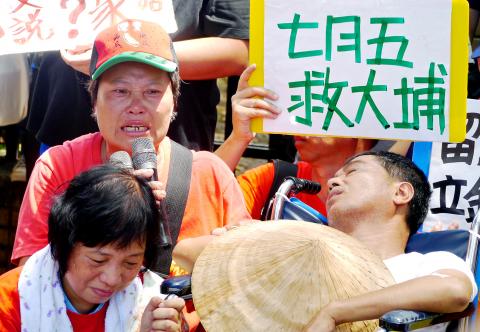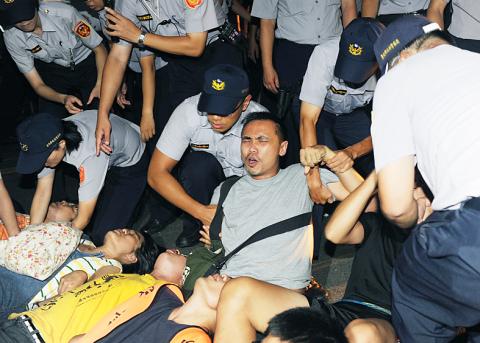Frustrated at a lack of response from Premier Jiang Yi-huah (江宜樺) over the impending demolition of the homes of four families in Dapu (大埔) in Miaoli County’s Jhunan Township (竹南), dozens of demonstrators yesterday climbed over the gates of the Executive Yuan in Taipei and clashed with police.
Meanwhile, the Presidential Office said later yesterday that Vice President Wu Den-yih (吳敦義) had asked the Miaoli County Government to suspend the planned demolition.
“If the premier is not coming out to see us, we are going in to see him,” Taiwan Rural Front spokeswoman Frida Tsai (蔡培慧) told the crowd, many of whom had been protesting outside the Executive Yuan for two days, as Jiang presided over a Cabinet meeting inside.

Photo: J. Michael Cole, Taipei Times
As Tsai led the crowd toward the front gate of the Executive Yuan while chanting “Keep your word, save the houses,” dozens of younger protesters quickly pulled out blankets, put them over the fence and climbed over into the Executive Yuan.
Several police officers rushed over to prevent the protesters from going into the Executive Yuan building, while demonstrators on the other side of the fence clashed with officers guarding the front gate.
Emotions were already running high prior to the clashes, especially after Chang Sen-wen (張森文), one of the Dapu residents whose house was scheduled for demolition by the Miaoli County Government any time after today, arrived in a wheelchair.

Photo: Lo Pei-der, Taipei Times
Chang lost consciousness early yesterday morning when he was removed by force by the police after two days of camp-in protest in front of the Executive Yuan. He fell unconscious and was still unconscious when he appeared at the demonstration at about 10:30am.
“I insisted on bringing him here, because this may be the last thing he can do for our home before it’s torn down,” Peng Hsiu-chun (彭秀春), Chang’s wife, said in tears. “Please save our home, please save my husband.”
Equally emotional was Chu Ping-kun (朱炳坤), another Dapu resident whose house is also to be demolished.
“My mother committed suicide two years ago because she was so worried about her home and land being taken over by the government. Despite promises by government officials, nothing seems to have changed,” Chu said.
“Seeing what’s happening now to Chang is like seeing what happened to my mother: My mother killed herself, but Chang could be forced into death by the government,” Chu said.
In tears and hardly able to talk, farmer Hung Hsiang (洪箱), from the neighboring township of Houlong (後龍), pleaded for help from the premier.
“I feel sad because I can’t do anything to help when a human life is disappearing in front of me,” Hung said. “A decision that you [the premier] make could save or kill a person. He [Chang] may survive today, but he would eventually die when his house is torn down. Why won’t you help save a life?”
Chang’s condition improved later yesterday afternoon and he returned home as the families and their supporters prepared for a rally in Dapu today.
Twenty-four houses were originally to be flattened to make way for a science park.
However, following fierce protests, the government agreed to allow residents to keep their homes following a negotiation presided over by Wu in 2010 when he was the premier.
However, the decision was overturned by the Ministry of the Interior and, while an administrative lawsuit is ongoing, four of the families received a new demolition order from the county government last month, asking them to tear down their own homes by today.
Meanwhile, the Presidential Office said Wu had called Miaoli County Commissioner Liu Cheng-hung (劉政鴻) yesterday morning and instructed him to suspend the demolition of the four houses scheduled for today, amid intense protests from local residents and their advocates.
Liu said the county government was not planning to demolish the houses today and that the deadline was for the four households to relocate.
He said the county government would handle the case in accordance with the law, and promised to continue to communicate with residents.
The Presidential Office said President Ma Ying-jeou (馬英九) is concerned about the case and expects government agencies to resolve the dispute.
Jiang, who on Wednesday seemed to favor the Miaoli Country Government’s demolition plan, did not comment on the issue at the Cabinet meeting yesterday.
Executive Yuan spokesperson Cheng Li-wun (鄭麗文) said Jiang took the issue very seriously and called on officials at the Ministry of the Interior and the Construction and Planning Agency to brief him about the matter after the Cabinet meeting.
Responding to a reporter’s question, Cheng said it was “too early to tell” whether Wu had broken his promise as the activists alleged.
Wu’s mediation of the case three years ago brought a satisfactory solution to the dispute between the Miaoli County Government and 20 households, Cheng said.
However, regulatory authorities later found it difficult to proceed because the four remaining houses stand in the way of traffic, Cheng said.
Later yesterday afternoon, Jiang said there was still “room for negotiation” to resolve the dispute over how to carry out the road projects involving the four houses, after Wu talked to him and Liu by telephone.
Wu has scheduled a meeting with Liu and him today on the issue, Jiang said, adding that he was hopeful for “better results” after the meeting.
Additional reporting by Shih Hsiu-chuan and Mo Yan-chih

SECURITY: As China is ‘reshaping’ Hong Kong’s population, Taiwan must raise the eligibility threshold for applications from Hong Kongers, Chiu Chui-cheng said When Hong Kong and Macau citizens apply for residency in Taiwan, it would be under a new category that includes a “national security observation period,” Mainland Affairs Council (MAC) Minister Chiu Chui-cheng (邱垂正) said yesterday. President William Lai (賴清德) on March 13 announced 17 strategies to counter China’s aggression toward Taiwan, including incorporating national security considerations into the review process for residency applications from Hong Kong and Macau citizens. The situation in Hong Kong is constantly changing, Chiu said to media yesterday on the sidelines of the Taipei Technology Run hosted by the Taipei Neihu Technology Park Development Association. With

A US Marine Corps regiment equipped with Naval Strike Missiles (NSM) is set to participate in the upcoming Balikatan 25 exercise in the Luzon Strait, marking the system’s first-ever deployment in the Philippines. US and Philippine officials have separately confirmed that the Navy Marine Expeditionary Ship Interdiction System (NMESIS) — the mobile launch platform for the Naval Strike Missile — would take part in the joint exercise. The missiles are being deployed to “a strategic first island chain chokepoint” in the waters between Taiwan proper and the Philippines, US-based Naval News reported. “The Luzon Strait and Bashi Channel represent a critical access

‘FORM OF PROTEST’: The German Institute Taipei said it was ‘shocked’ to see Nazi symbolism used in connection with political aims as it condemned the incident Sung Chien-liang (宋建樑), who led efforts to recall Democratic Progressive Party (DPP) Legislator Lee Kun-cheng (李坤城), was released on bail of NT$80,000 yesterday amid an outcry over a Nazi armband he wore to questioning the night before. Sung arrived at the New Taipei City District Prosecutors’ Office for questioning in a recall petition forgery case on Tuesday night wearing a red armband bearing a swastika, carrying a copy of Adolf Hitler’s Mein Kampf and giving a Nazi salute. Sung left the building at 1:15am without the armband and apparently covering the book with a coat. This is a serious international scandal and Chinese

COUNTERINTELLIGENCE TRAINING: The ministry said 87.5 percent of the apprehended Chinese agents were reported by service members they tried to lure into becoming spies Taiwanese organized crime, illegal money lenders, temples and civic groups are complicit in Beijing’s infiltration of the armed forces, the Ministry of National Defense (MND) said in a report yesterday. Retired service members who had been turned to Beijing’s cause mainly relied on those channels to infiltrate the Taiwanese military, according to the report to be submitted to lawmakers ahead of tomorrow’s hearing on Chinese espionage in the military. Chinese intelligence typically used blackmail, Internet-based communications, bribery or debts to loan sharks to leverage active service personnel to do its bidding, it said. China’s main goals are to collect intelligence, and develop a